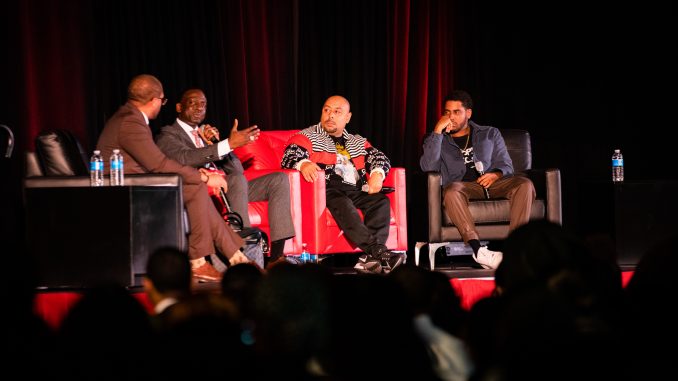
Yusef Salaam and Raymond Santana of the “Exonerated Five,” walked in one-by-one to thunderous applause and a standing ovation from hundreds of Temple students at Pearson-McGonigle Hall on Wednesday
Salaam and Santana are two of five men known as the “Central Park Five,” incarcerated as teenagers for allegedly assaulting and raping jogger Trisha Meili in 1989. The five were exonerated of any wrongdoing by DNA evidence in 2002.
The 2019 Emmy nominated Netflix series, “When They See Us,” premiered on May 31, telling their stories 17 years after their convictions were vacated.
On Wednesday, the two men spoke to students alongside Emmy-award winning actor Jharrel Jerome, who plays Korey Wise, another member of the “Exonerated Five,” in the series.
Throughout the event, the three men discussed their childhood home life in New York City, the struggles they faced growing up as minorities, corruption within the criminal justice system, and the accuracy of the Netflix series.
Aini Dennis, a freshman film major who attended the event, said that her parents told her about the Central Park Five’s story at a young age.
“I’ve been around and I’ve heard about it my whole life, so their story is important to me and to my community,” Dennis said.
While speaking at the event, Jerome said portraying Wise had really taught him the true power of strength and will.
“Meeting Korey Wise was probably one of the greatest things that has ever happened in my life, and changed my life tremendously,” Jerome said.
The first time the cast members did a table read of the script in front of the five men, there wasn’t “a dry eye in the room,” he added.
“I looked at Korey, and he looked at me, and he took the chain off of his neck and put it on me, and looked at me and said, ‘You’re Korey Wise,” Jerome said.
“You met them, and you were shocked that they went through what they went through because of the strength that they hold, and how eloquent and positive they are, whereas I would be pissed,” Jerome added.
Throughout the event Salaam and Santana spoke to the crowd about the problems within the criminal justice system, which Salaam dubbed the “criminal injustice system.” Santana also encouraged students to take on positions of power in order so that one day, they can make a change.
“We don’t discourage you from being a prosecutor. We don’t discourage you from being a police officer. We want you to go into those elements, and we want you to go to those positions at the table. Become president, because we need you in those positions,” Santana said.
Langston Collins, a sophomore communication studies major, said that this event helped students gain a better sense of our country’s criminal justice system, and he hopes that this better understanding can somehow evoke change.
“I think that it’s showing that we’re finally starting to understand, in a small sense, the degree to which our justice system is so broken, how young Black boys like myself and many others are targeted by the police,” Collins said.
“Finally they’re starting to get out and be able to tell their stories in a way that’s hopefully going to wake some people up to and hopefully some young officers are going to take note of this,” he added.
Darrian Nixon, a freshman health professions major, thinks events like this are important and give students an opportunity to pay their respects to people who have suffered greatly in their lifetimes, he said.
“I think it’s very important. I had no idea that they would come through to something like this at this point,” Nixon said. “So I think it’s special to be able to be here and pay respect to what they’ve been through and be a part of it.”
Toward the end of the event, Salaam performed a rap he wrote for his final statement in court at the end of the 1990 trial, telling students that even when they find themselves feeling hopeless, they should always keep their heads up.
“I want you to know, that when you find yourself in some form of dark places, there’s always a light somewhere in the darkness. Even if that light is inside you, you can illuminate your own darkness by shining your light,” Salaam said.


Be the first to comment